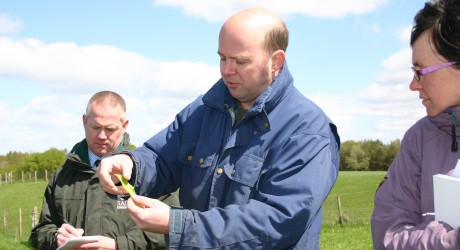THE benefits of grazing sheep on chicory was one of the main topics discussed at the recent Clyde monitor farm meeting, hosted by Andrew Baillie of Carstairs Mains in South Lanarkshire.
On his 650 acre (263 ha) unit, one of the network of Quality Meat Scotland (QMS) monitor farms throughout Scotland, Mr Baillie runs a breeding flock of approximately 230 ewes.
The majority of these are pedigree – 100 Beltex and 50 Texels.
All commercial lambs, plus pedigrees not selected for breeding, are finished.
Mr Baillie has already had some experience with chicory. “Last year, I asked the seed merchant to suggest an alternative break crop, which would be good for grazing sheep.
“He suggested a chicory, clover and Timothy mix. When I looked into information on chicory, I was impressed by the lamb growth figures quoted, so decided to give it a go.”
In June 2012, Mr Baillie sowed 12 acres with 2kgs per acre each of Puna 11 Chicory and Scots Timothy, plus 0.5 kg per acre of Alice White Clover.
“I had been pre-warned that I would need to keep the chicory grazed down to prevent it from bolting,” explained Mr Baillie.
“So I grazed it hard, turning ewes and lambs onto it as soon as there was a bite. The lambs really thrived and, although I wasn’t sure what to expect, what did take me by surprise was that although the lambs had been receiving creep before they went onto the chicory, once they were on, they ignored the creep.
“At first, I thought they didn’t know where the creep was, so drove them down to it, but they still weren’t interested!”
Chicory has a reputation for controlling worms in sheep. Mr Baillie did not monitor egg counts in 2012.
However, the intention is to do so this year, working with Dr Jos Houdijk of the Scotland’s Rural College (SRUC) Disease Systems Team, to compare worm burdens and performance of sheep grazed on chicory, with sheep grazed on conventional clover and ryegrass pasture.
At the meeting Dr Houdijk gave the community group the results of some of their previous trial work, involving areas of newly-established pure chicory.
“One of the first trials involved two groups of lambs of the same age, weight and worm burdens,” explained Dr Houdijk.
“One group was turned onto pure chicory, the other onto clover and ryegrass. After two weeks the worm burdens of both groups were assessed.
“The worm burden of the chicory-grazed group had reduced by around 50 per cent in comparison to the clover and ryegrass-grazed group, suggesting that short-term grazing of plots of pure chicory could be used for partial de-worming in a rotational grazing system.”
A further SRUC trial conducted by Dr Houdijk, had compared the faecal egg count and daily liveweight gain of two groups of wormy, weaned lambs grazed for nine weeks.
One group grazed newly-established pure chicory and the other group grazed clover and ryegrass.
“The worm count from the chicory-grazed lambs was 65 per cent lower than the lambs which had grazed the clover and ryegrass,” commented Dr Houdijk.
“The chicory-fed lambs had also grown 25 per cent faster. A subsequent study demonstrated that chicory lambs achieved superior killing out percentages and grades, and consequently better prices.
“An additional benefit is that the reduction in the faecal egg count of chicory-grazed lambs also reduces the larval infection of the grazing.”
Dr Houdijk added that, while trials suggest that the impact of second year chicory on faecal egg count is possibly less, lambs grazed on two year-old chicory still out-performed grass-clover ones and required less worm drenching.
Many of the community group members were keen to establish whether or not chicory could help to control liver fluke.
However, Dr Houdijk reported that there is currently no evidence to suggest that chicory controls fluke.
The next Clyde monitor farm meeting will be at the end of July/early August.
For more information, please contact either of the joint facilitators:
Grant Conchie on 01555 662562 or email grant.conchie@sac.co.uk
Or Raymond Crerar on 01292 525458 or email Raymond.crerar@sac.co.uk
For general information on monitor farm, plus detailed reports of meetings: www.qmscotland.co.uk/monitorfarms
Caption: Dr Jos Houdijk of the Scotland’s Rural College (SRUC) Disease Systems Team, holding a chicory leaf and explaining its properties to the community group.
MEDIA RELEASE posted by Quality Meat Scotland. You too can post media releases (aka press releases) on allmediascotland.com. For more information, email here.
Contact: Carol McLaren
Phone: 0131 472 4112
Email: cmclaren@qmscotland.co.uk
Website: http://www.qmscotland.co.uk






